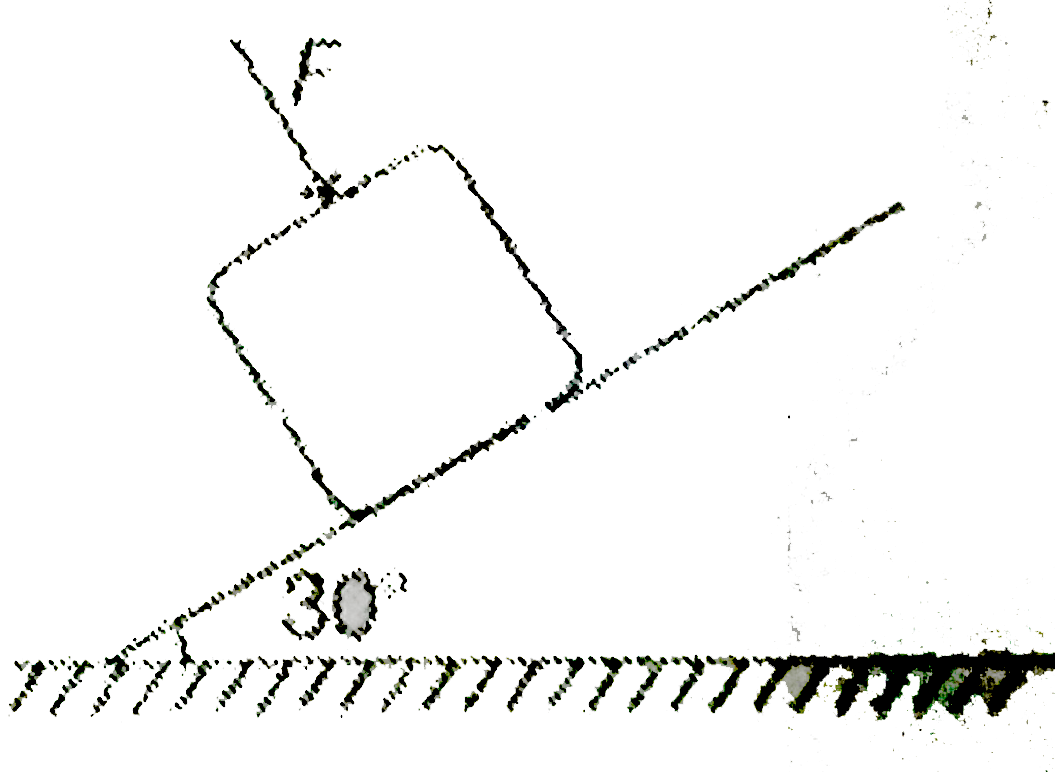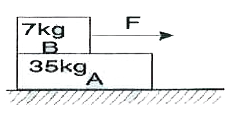A block of mass 2kg lying on ice when given a velocity of 6ms−1 is stopped by friction in 5s. The coefficient of friction between the block and ice is (g=10 ms−2)
0.5
0.2
0.12
0.4
The correct Answer is:C
To solve the problem step by step, we will use the concepts of motion and friction.
Step 1: Identify the given data
- Mass of the block, m=2kg
- Initial velocity, u=6m/s
- Final velocity, v=0m/s (since the block stops)
- Time taken to stop, t=5s
- Acceleration due to gravity, g=10m/s2
Step 2: Calculate the acceleration
Using the equation of motion:
v=u+at
Substituting the known values:
0=6+a⋅5
Rearranging gives:
a⋅5=−6⟹a=−65=−1.2m/s2
Step 3: Relate acceleration to friction
The acceleration due to friction can be expressed as:
a=−μg
where μ is the coefficient of friction. Substituting g=10m/s2:
−1.2=−μ⋅10
Removing the negative signs gives:
1.2=μ⋅10
Step 4: Solve for the coefficient of friction
Now, we can solve for μ:
μ=1.210=0.12
Conclusion
The coefficient of friction between the block and the ice is:
μ=0.12
---
- Mass of the block, m=2kg
- Initial velocity, u=6m/s
- Final velocity, v=0m/s (since the block stops)
- Time taken to stop, t=5s
- Acceleration due to gravity, g=10m/s2
Using the equation of motion:
v=u+at
Substituting the known values:
0=6+a⋅5
Rearranging gives:
a⋅5=−6⟹a=−65=−1.2m/s2
The acceleration due to friction can be expressed as:
a=−μg
where μ is the coefficient of friction. Substituting g=10m/s2:
−1.2=−μ⋅10
Removing the negative signs gives:
1.2=μ⋅10
Now, we can solve for μ:
μ=1.210=0.12
The coefficient of friction between the block and the ice is:
μ=0.12
Topper's Solved these Questions
- LAWS OF MOTIONBOOK - AAKASH SERIESCHAPTER - LAWS OF MOTIONEXERCISE - EXERCISE - II
136 Videos
- GEOMETRICAL OPTICSBOOK - AAKASH SERIESCHAPTER - GEOMETRICAL OPTICSEXERCISE - ADDITIONAL PRACTICE EXERCISE (LEVEL-II PRACTICE SHEET (ADVANCED) INTEGER TYPE QUESTIONS)
10 Videos
- LOGIC GATESBOOK - AAKASH SERIESCHAPTER - LOGIC GATESEXERCISE - Exercise (Very Short Answer)
10 Videos
Similar Questions
A marble block of mass 2 kg lying on ice when given a velocity of 6m/s is stopped by friction in 10s. Then the coefficient of friction is
View SolutionA marble block of mass 2 kg lying on ice when given a velocity of 6m/s is stopped by friction in 10s. Then the coefficient of friction is
View Solution
Knowledge Check
A block of mass m=2kg is resting on a rough inclined plane of inclination of 30∘ as shown in figure. The coefficient of friction between the block and the plane is μ=0.5. What minimum force F should be applied perpendicular to the plane on the block, so that blocks does not slip on the plane? (g=10m/s2)
 A2.68 NBZeroC4.34 ND6.24 N
A2.68 NBZeroC4.34 ND6.24 NA block of mass 2kg rests on a rough inclined plane making an angle of 30∘ with the horizontal. The coefficient of static friction between the block and the plane is 0.7. The frictional force on the block is
A10.3NB23.8NC11.9ND6.3N
A man of mass 60 kg sitting on ice pushes a block of mass of 12kg on ice horizontally with a speed of 5 ms−1. The coefficient of friction between the man and ice and between block and ice is 0.2. If g =10 ms−2, the distances between man and the block, when they come to rest is
View SolutionA block is lying on an inclined plane which makes an angle of 60∘ with the horizontal. If coefficient of friction between the block and the plane is 0.25 and g = 10 ms−2, the acceleration of block when it is moves along the plane will be
View SolutionA block of mass 2kg rests on a rough inclined plane making an angle of 30∘ with the horizontal. The coefficient of static friction between the block and the plane is 0.7. The frictional force on the block is
View SolutionBlock of mass 10 kg is moving on inclined plane with constant velocity 10 m/s. The coedfficient of kinetic friction between incline plane and block is :-
View SolutionBlock A of mass 35kg is resting on a frictionless floor. Another block B of mass 7kg is resting on it as shown in the figure. The coefficient of friction between the blocks is 0.5 while kinetic friction is 0.4.(g=10ms−2)

The minimum value of force to cause block B to move with respect to block Ais :
View SolutionA block of mass 20 kg is acted upon by a force F=30N at an angle 53∘ with horizontal in downward direction as shown. The coefficient of friction between the block and the forizontal surface is 0.2. The friction force acting on the block by the ground is (g=10ms2)
View Solution
